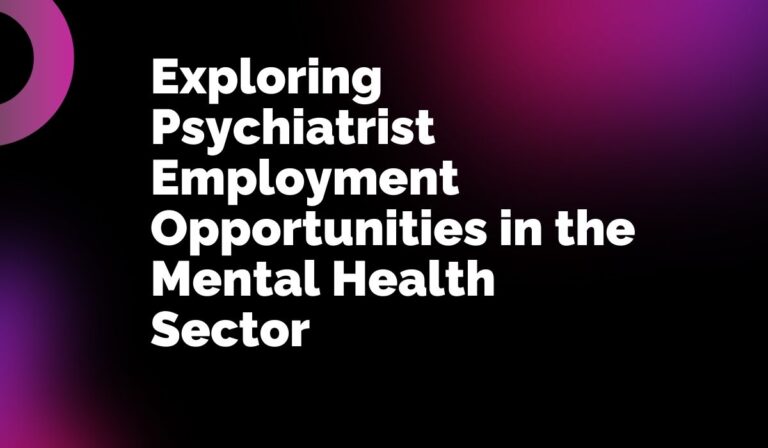
The Scope of Mental Health Careers
Mental health has increasingly become a focal point of concern within public health domains around the world. The demand for qualified mental health professionals, particularly psychiatrists, has been on a significant rise. The importance placed on mental well-being, coupled with a growing awareness of mental health issues, has led to a broader spectrum of psychiatrist employment opportunities.
The Role of Psychiatrists within the Mental Health Sector
Psychiatrists play a vital role in the diagnosis, treatment, and management of mental illnesses. Their expertise spans various psychological conditions from anxiety and depression to more severe cases such as schizophrenia and bipolar disorder. Psychiatrists are medical doctors specialised in mental health, capable of prescribing medication, and offering therapy to patients of various demographics.
Trends Influencing Psychiatrist Employment
Several trends have been influencing the landscape of psychiatrist employment. Technological advancements, evolving societal norms, and legislative reforms in mental healthcare delivery have all played parts in shaping the career prospects for professionals within this sector. There’s been a recognisable shift towards integrated care models, telepsychiatry, and community-based approaches which open various avenues for employment.
Qualifications and Training for Aspiring Psychiatrists
For those considering a career as a psychiatrist, the journey begins with a medical degree, followed by specialised training in mental health. In some regions, additional subspecialty training can differentiate candidates in fields such as child and adolescent psychiatry, forensic psychiatry, or geriatric psychiatry, thus enhancing employment prospects.
Diversity of Psychiatrist Employment Opportunities
The diversity of psychiatrist employment opportunities cannot be overstated. Aside from traditional clinical roles, psychiatrists can find careers in academic research, teaching, policy-making and even corporate consulting. This versatility allows psychiatrists to tailor their careers to their specific areas of interest and expertise.
Geographical Variations in Career Opportunities
Geographical variances also affect employment opportunities for psychiatrists. Urban areas, traditionally, have a higher demand due to greater population densities, but rural areas are increasingly recognised as needing mental health services, which often translates into lucrative offers for professionals willing to serve these communities.
Navigating the Job Market
The current job market for psychiatrists is competitive yet booming. It is important for professionals to stay informed about the latest trends in mental health care and be adept at networking and building professional relationships within the industry. Utilising dedicated medical recruitment platforms can provide a significant advantage in locating coveted positions.
The Impact of Global Events on Mental Health Careers
Global events such as the COVID-19 pandemic have not only highlighted the necessity for mental health support but have accelerated the evolution of psychiatrist roles. The pandemic-induced surge in mental health cases has led to an expansion in psychiatrist positions within various settings, including virtual platforms.
Benefits of Choosing a Career in Psychiatry
One compelling reason for pursuing a career in psychiatry is the profound impact that one can have on individual lives and broader communities. Psychiatrists often report high levels of job satisfaction, stemming from the positive changes they facilitate in their patients’ lives. Additionally, the career offers stability and a competitive salary.
Work-Life Balance in Psychiatry
Maintaining a healthy work-life balance is an essential consideration for anyone pursuing a career in psychiatry. Opportunities in private practice, part-time work, and job sharing are examples of how the field can offer a balanced lifestyle, attractive to individuals who value both their professional commitments and personal life.
The Role of Ongoing Education and Professional Development
Ongoing education and professional development remain cornerstones of a successful career in psychiatry. Psychiatrists are expected to engage in continued learning to keep pace with new therapies, medications, and practices within the realm of mental health care.
Challenges Facing Psychiatrists in the Mental Health Sector
While the career prospects are abundant, psychiatrists also face challenges such as navigating the complexities of mental health stigma and therapy accessibility. Additionally, they must address the ethical implications of rapidly developing fields such as digital psychiatry and artificial intelligence in mental health.
Conclusion: Embracing a Dynamic and Rewarding Career Path
Embarking on a career as a psychiatrist within the mental health sector can be both dynamic and rewarding. From offering therapeutic interventions to driving policy changes, psychiatrists play a crucial role in shaping mental health landscapes. The sector’s diversity in roles, alongside the increasing demand for qualified practitioners, indicates that psychiatrist employment opportunities will continue to grow, making it an ideal time for interested parties to consider this fulfilling career path.
Final Thoughts
Whether you are a seasoned psychiatrist looking for new challenges or a medical student contemplating your specialization, the mental health sector promises a fulfilling and impactful career. The opportunities are vast and varied, serving as a reminder that mental health is an ever-evolving field, ripe with potential for dedicated professionals eager to make a difference.